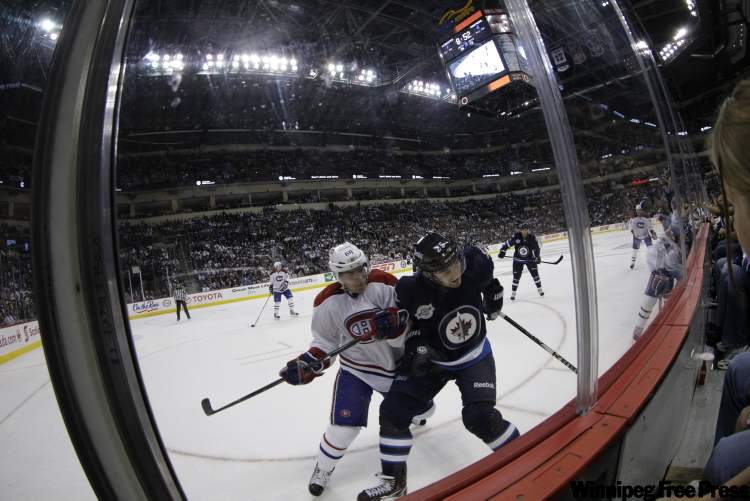Jets have winning formula
Report outlines keys to success for pro sports teams
Advertisement
Read this article for free:
or
Already have an account? Log in here »
To continue reading, please subscribe:
Monthly Digital Subscription
$0 for the first 4 weeks*
- Enjoy unlimited reading on winnipegfreepress.com
- Read the E-Edition, our digital replica newspaper
- Access News Break, our award-winning app
- Play interactive puzzles
*No charge for 4 weeks then price increases to the regular rate of $19.95 plus GST every four weeks. Offer available to new and qualified returning subscribers only. Cancel any time.
Monthly Digital Subscription
$4.99/week*
- Enjoy unlimited reading on winnipegfreepress.com
- Read the E-Edition, our digital replica newspaper
- Access News Break, our award-winning app
- Play interactive puzzles
*Billed as $19.95 plus GST every four weeks. Cancel any time.
To continue reading, please subscribe:
Add Free Press access to your Brandon Sun subscription for only an additional
$1 for the first 4 weeks*
*Your next subscription payment will increase by $1.00 and you will be charged $16.99 plus GST for four weeks. After four weeks, your payment will increase to $23.99 plus GST every four weeks.
Read unlimited articles for free today:
or
Already have an account? Log in here »
Hey there, time traveller!
This article was published 20/10/2011 (5195 days ago), so information in it may no longer be current.
If the Conference Board of Canada had to pick a poster child for successful sports franchises in the country, it might very well pick the Winnipeg Jets.
In a report released Wednesday, the Ottawa-based research organization outlined the keys to success for professional sports teams and it sounded eerily similar to the blueprint unveiled by the Jets over the last several months.
“You have to have the best management possible and make sure you put the best team on the field and be honest about it. Not every market has the pockets of the New York Yankees,” said Mario Lefebvre, director of the Centre for Municipal Studies and co-author of the board’s Playing in the Big Leagues: Some Real-World Examples of Why Pro Sports Franchises Succeed… or Fail.

“In smaller markets, you have to run a tight ship, not get crazy and try your best to put together a team that can compete on the field of play.”
True North Sports & Entertainment, the owner of the Jets, has said repeatedly it would be among the mid-range spenders in the NHL in its inaugural season and beyond.
Lefebvre said ownership plays a vital role in establishing the culture of the organization, which is reflected in who it hires to run things and its place in the community.
He praised True North’s vision in getting the MTS Centre built more than seven years ago. A modern facility can work wonders in turning a franchise around or dooming it to failure. Two of the best examples come from the world of baseball. While playing in Olympic Stadium wasn’t the sole reason behind the departure of the Montreal Expos for Washington, D.C., in 2004, it certainly didn’t help. On the flip side, the Cleveland Indians, long a laughing-stock while they languished in an outdated football stadium, became a perennial contender and a financial success after moving into Jacobs Field, now known as Progressive Field, in 1994.
Of course, management can only control so much but Lefebvre says the Jets and all Canadian NHL franchises are in a unique sweet spot that has the wind at their backs.
That includes a loonie that has been at or around par with the U.S. greenback for many months and a league that now operates under a salary cap.
“When the Quebec Nordiques left (for Colorado) in 1995 and the Jets left for Phoenix in 1996, the loonie was in the mid-70-cent range. That was quite a strike against the Canadian teams, because players who were becoming free agents were more and more considering the U.S. as a place to play,” he said.
“Now that the dollar is at par, I wonder if the next NHL contracts might stipulate that they’re paid in Canadian dollars?”
But no matter how much success a franchise achieves, fan support and financial success can’t be taken for granted. Lefebvre pointed to the storied Montreal Canadiens, the most successful team in the history of the NHL with 24 Stanley Cup wins. But even that winning tradition didn’t prevent a bit of a fan revolt earlier this decade after a string of non-playoff seasons.
“The Habs weren’t as popular just a few years ago as they are now. People were starting to realize that there were alternatives to spending a good evening in Montreal. If there’s any team where you would think, ‘no matter how bad it gets, (fans) will come on coming,’ it’s them. But if the (lack of success) had continued for another five or eight years, I’m not sure what would have happened,” he said.
geoff.kirbyson@freepress.mb.ca



